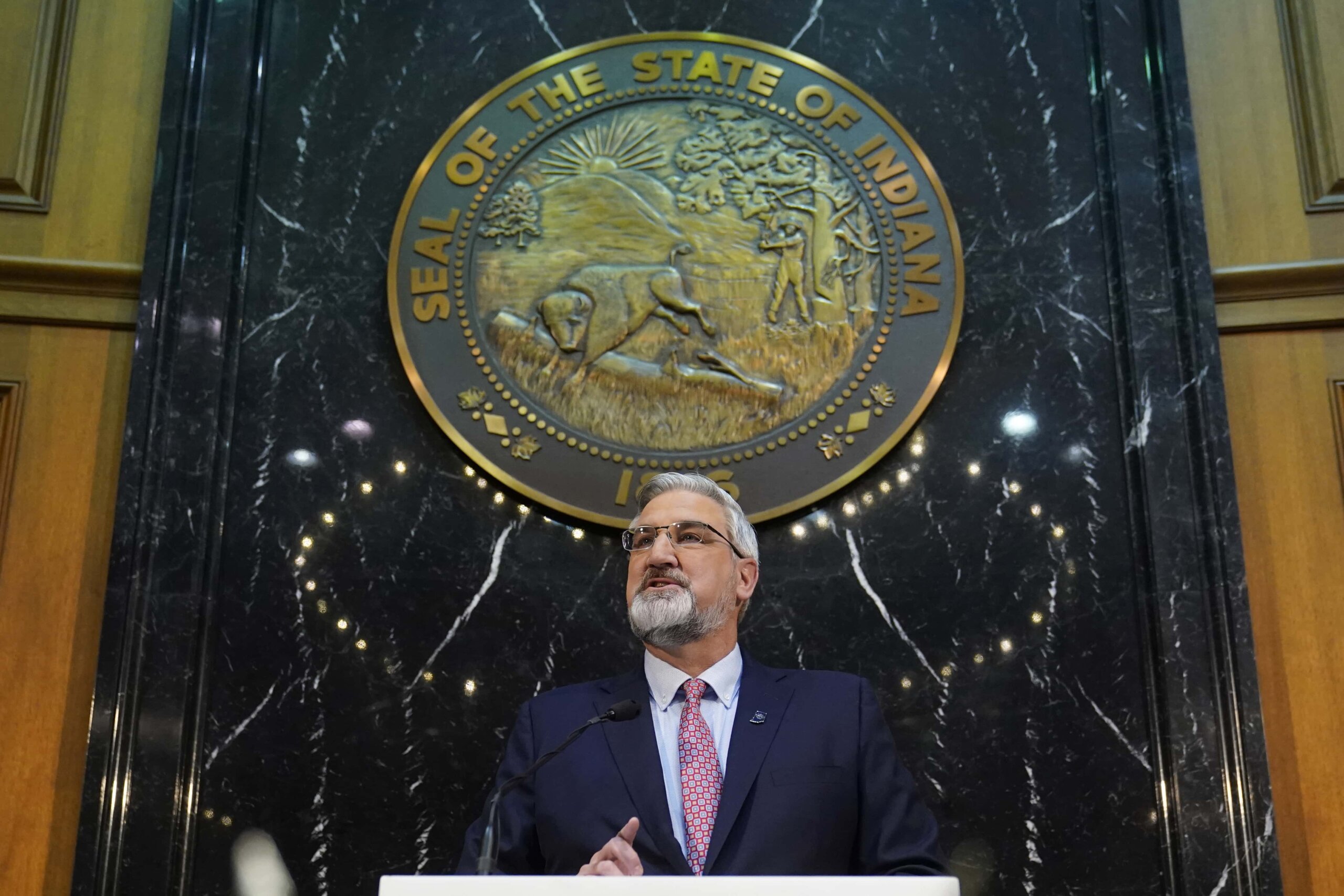Indiana’s Republican Gov. Eric Holcomb became the first governor in 2022 to veto a piece of anti-trans legislation after he nixed a bill that would have banned trans girls and women from participating on women’s sports teams.
While he had previously signaled support for the legislation, Holcomb explained in a two-page letter accompanying his March 21 decision that the legislation, known as House Bill 1041, is not explicit enough about how it would ensure fairness in K-12 athletics. Holcomb’s letter said it’s unclear how criteria for who is allowed to participate would be determined and that the bill “leaves too many unanswered questions.”
“It implies that the goals of consistency and fairness in competitive female sports are not currently being met,” he wrote. “After thorough review, I find no evidence to support either claim even if I support the overall goal.”
Holcomb’s veto was surprising given his previous comments on the bill. While he had not taken an explicit stance on the bill, the governor signaled that he “adamantly” believed “boys should be playing boys sports and girls should be playing girls sports” in a February press call, as the Indianapolis Star reports.
LGBTQ2S+ advocates applauded the decision and urged the state’s legislature to allow the veto to stand. Cathryn Oakley, state legislative director for the Human Rights Campaign (HRC), noted that supporters of the bill “could not summon even a single example where someone was impacted as a result of transgender students participating in school sports, which they’ve done for decades across the country.”
“All Indiana children deserve better than being treated as political pawns,” Oakley said in a statement.
If Indiana lawmakers attempt to override Holcomb’s veto, a vote could theoretically take place as soon as May 24, according to the Associated Press. All it would take is a simple majority of the Indiana Legislature to force the bill through.
The action marks the first veto of a piece of anti-trans legislation by any governor in 2022, and it will likely not be the last. Utah Gov. Spencer Cox, also a Republican, has promised to strike down his state’s proposed anti-trans sports ban, which has undergone substantial revisions since it was originally introduced.
The Utah bill was initially proposed as a “compromise” on trans inclusion, calling for the formation of a committee that would decide on a case-by-case basis whether trans youth could participate on sports teams. But after Republican legislators altered the bill to be a wholesale ban on trans girls’ in women’s sports at the last minute, the Utah legislature passed the bill on March 4 and sent it to Cox’s desk.
When asked about the legislation, Cox expressed reservations similar to Holcomb’s.
“Anyone that’s interacted with the transgender community understands how amazing they are and how difficult it can be for them,” he told the Salt Lake Tribune earlier this month. “I don’t want to make things harder for them than they have to be.”
Last year, several GOP governors also took a stand against the record number of anti-trans bills being pushed across the United States. North Dakota’s governor vetoed an anti-trans sports ban last April, while Arkansas’ Asa Hutchinson refused to sign a ban on trans youth medical care into law that same month. In the case of Arkansas, the state legislature took just 24 hours to override the veto.
South Dakota’s Republican governor, Kristi Noem, also vetoed an anti-trans sports bill in 2021 over “stylistic concerns.” But facing national criticism from GOP leaders over the decision, Noem effectively punted the issue by putting forward two executive orders calling on the state’s Board of Regents and Board of Education to draft policies banning trans athletes from K-12 and college sports. Noem signed an anti-trans sports ban into law this March after personally authoring her own legislation.
Eleven states have signed anti-trans sports bans into law in recent months—most of which apply specifically to trans girls and women, while others target trans youth more generally. Iowa is the most recent to join these ranks, when Republican Gov. Kim Reynolds signed House File 2416 into law earlier this month.
Kentucky is likely to be next after an anti-trans sports ban passed its state House last week. While the state’s Democrat governor, Andy Beshear, is generally supportive of LGBTQ2S+ rights, a veto could be easily overridden by a simple majority vote.
Indiana lawmakers advanced five other anti-LGBTQ2S+ bills in the 2022 session, including one criminalizing health care for trans minors, according to the national advocacy group Freedom for All Americans. The state’s legislature concluded its 2022 session earlier this month without passing any of the other bills. (As has been the case in past sessions, they are likely to be taken up again next year.)


 Why you can trust Xtra
Why you can trust Xtra


